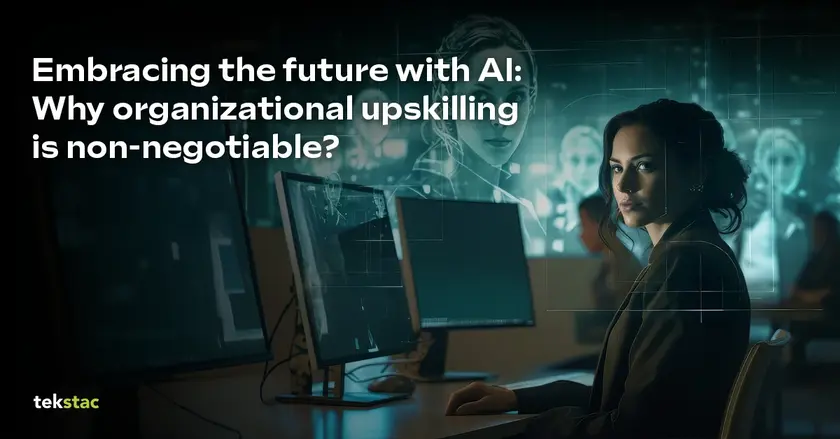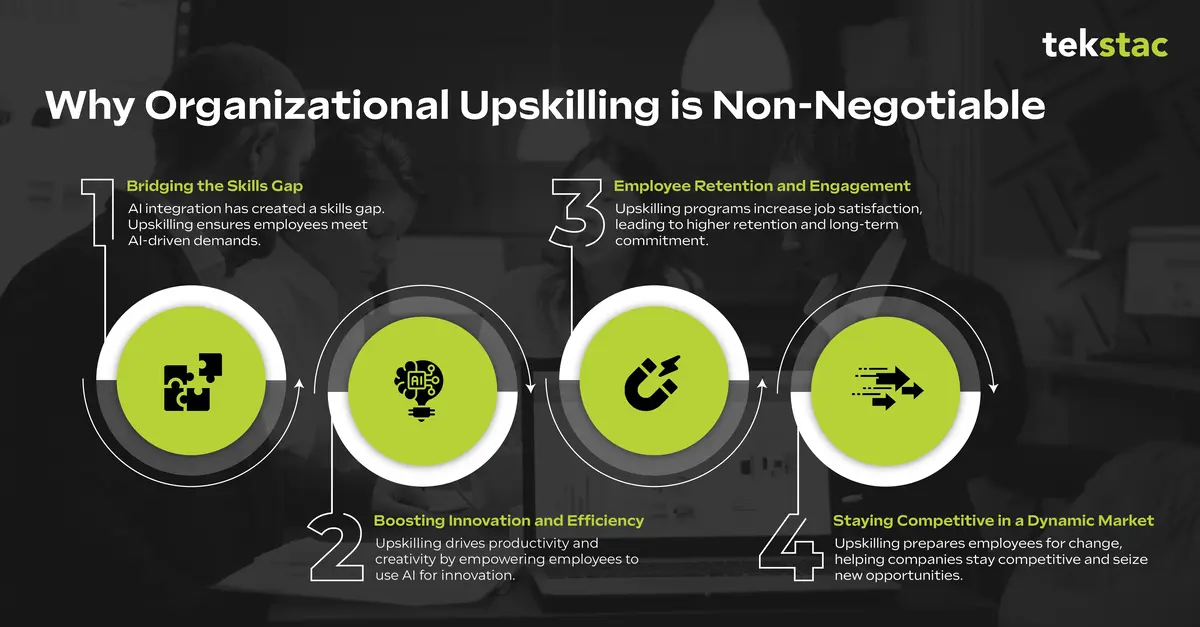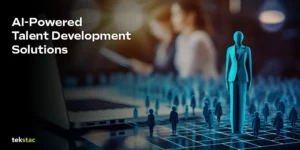Why organizational upskilling is non-negotiable in the AI Era?

In today’s rapidly evolving technological landscape, embracing the future with AI is no longer a choice- it’s a strategic imperative. As artificial intelligence (AI) continues to revolutionize industries, businesses face a critical decision: adapt or fall behind. Organizational upskilling has emerged as the foundation of this adaptation, enabling companies to harness the power of AI while ensuring their workforce remains relevant and competitive.
In this blog let’s explore why AI integration and workforce development are crucial for future-proofing businesses and how skill enhancement can drive success.
The Critical Role of Upskilling in an AI-Driven Workplace
The rise of AI is a defining feature of the Fourth Industrial Revolution. It’s transforming industries by automating routine tasks, enhancing decision-making with advanced data analytics, and enabling innovation at unprecedented levels. From AI-powered chatbots improving customer service to machine learning models driving data insights, AI integration is redefining how companies operate.
However, organizations need a workforce capable of working alongside AI systems to harness AI’s benefits completely. Traditional roles are being disrupted, and new roles requiring skills in AI, data analysis, and machine learning are emerging. This shift emphasizes the importance of “organizational upskilling“— ensuring that employees have the right expertise and skills to thrive in an AI-driven environment.
Upskilling the workforce ensures that employees can effectively leverage AI tools, driving innovation and productivity
Why Organizational upskilling is non-negotiable?

1. Bridging the Skills Gap
The rapid pace of AI integration has created a skills gap in the IT sector. Employees who once excelled in their roles may find themselves struggling to keep up with new technologies. By investing in upskilling programs, organizations can bridge this gap, ensuring that their workforce is capable of meeting the demands of AI-driven workflows.
2. Boosting Innovation and Efficiency
Future-proofing with AI requires a workforce capable of using AI technologies to innovate. Employees who understand how to integrate AI into their workflows can unlock new levels of productivity and creativity. AI can automate repetitive tasks, freeing employees to concentrate on high-impact work that contributes to business growth.
3. Employee Retention and Engagement
In today’s competitive job market, employees seek opportunities for growth and development. Organizations that prioritize upskilling demonstrate a commitment to their employees’ long-term success, leading to higher levels of job satisfaction and retention. In this way, employees who are engaged are more likely to stay with the organization and actively support its growth.
4. Staying Competitive in a Dynamic Market
The business world is ever evolving, and staying competitive demands a workforce capable of adapting to change. Organizational upskilling ensures that employees are prepared for future challenges and can contribute to the company’s success in a dynamic market. Companies that invest in upskilling are better positioned to capitalize on new opportunities and navigate disruptions effectively.
4 Effective Strategies for Organizational Upskilling

Implementing a successful upskilling strategy requires careful planning and execution. Here are a few important strategies organizations can employ to ensure their workforce is ready for the future:
1. Conduct a Skills Audit
Before launching any upskilling initiative, organizations should assess the current skills within their workforce and identify areas that need improvement. This skills audit can help determine the specific competencies required to support AI integration. By identifying gaps in knowledge and expertise, companies can design targeted training programs that address these needs.
Ironically, AI itself can play a crucial role in workforce development. AI-powered learning platforms can offer personalized training experiences, tailoring content to the unique learning needs and preferences of each employee.
These platforms can track progress, provide instant feedback, and adapt to an individual’s pace, ensuring that learning is efficient and effective.
2. Provide Hands-On Learning Opportunities
While theoretical knowledge is essential, hands-on experience is equally important when it comes to mastering AI-related skills. Organizations should offer hands-on learning opportunities, such as workshops, hackathons, or AI project collaborations, where employees can put their new skills into practice in real-world scenarios. This approach not only boosts learning but also promotes a culture of experimentation and innovation.
3. Involve Leadership and Promote AI Champions
Successful organizational upskilling requires leadership support. Leaders must champion the importance of AI integration and actively participate in the upskilling process. By promoting AI champions within the organization—employees who are particularly skilled in AI technologies—businesses can create role models who inspire others to embrace new tools and technologies.
4. Measure Impact and Iterate
Upskilling is not a one-off initiative but an ongoing process that requires monitoring and adjustment. Organizations should measure the impact of their upskilling programs through key performance indicators (KPIs) such as employee engagement, productivity improvements, and successful AI project implementations. Regularly evaluating the effectiveness of these programs ensures that they continue to deliver value.
Conclusion- The Future of Work Starts Now
“Embracing the future with AI” is not a distant vision—it’s happening now. To stay competitive and innovative in this AI-driven era, organizations must invest in organizational upskilling. The future of work demands a workforce that is agile, knowledgeable, and capable of leveraging AI technologies to their full potential.
By prioritizing workforce development and fostering a culture of continuous learning, businesses can not only survive but thrive in the age of AI integration.
Organizational upskilling is not just about keeping pace with technology; it’s about unlocking the full potential of AI to drive growth, efficiency, and innovation for years to come.
👉 Learn how upskilling powers digital transformation
Organizational Upskilling FAQs:
1. What is all about organizational upskilling?
Organizational upskilling equips employees with new, future-ready skills aligned with evolving tech and industry needs—fueling growth, confidence, and adaptability.
2. Why is continuous learning essential in the age of AI?
AI is evolving fast. Continuous learning helps employees stay relevant, adapt to change, and work effectively with emerging technologies.
3. What is upskilling and reskilling in Talent Development?
Upskilling enhances current skills to stay relevant. Reskilling teaches new skills for new roles—both vital for workforce agility and career growth.
4. How can organizations implement upskilling effectively?
Start by identifying skill gaps, aligning training with business goals, and using tech-driven tools like LMS, mobile learning, and real-time analytics for personalized, scalable learning.





